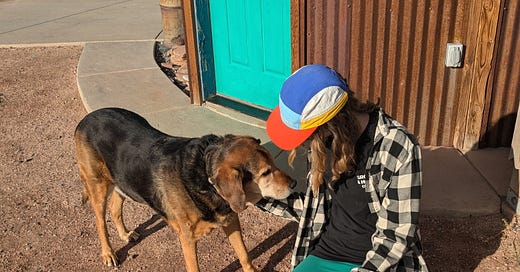An ode to an ancient winery dog
Thank you for reminding me to relax. And limit the curmudgeon stuff.
Written on November 9th, parked amongst apple trees, glass of wine at hand.
Scout is my favorite dog of all time ever. She is perfect (I tell her so each day) and makes us very proud (Sean usually relays this one) and should live eternally so I never face a morning without her lopsided tail wag.
She’s also, you know… Scout. Our cattle dog hasn’t always been—still isn’t—easy in the way I thought dogs were supposed to be as a kid. I think many (perhaps even most?) American homes would not enjoy living with her quirks. It’s weird to feel this as true yet also trust how well we fit together, how ideal our partnership has become, how incredible she is in all these other capacities. She’s not the dog for everyone. She is the dog for me.
Because of Scout’s traits—namely her wariness of strangers’ physical touch and generalized fear—I’ve become reserved in any interaction with a new dog. I default to treating an unfamiliar canine the way Scout prefers (that is, ignore them and under no circumstances reach for their head right away) and then, only after they’ve given me an obvious sign of wanting direct contact, start the process of identifying what kind of love they like best. (Ear scratches are in the lead across an ever-growing sample size.)
This is a good approach. I think dogs and people everywhere would be better off if it was a more common default. It’s absurd to think all pets must love rough rubs and smothering from people they’ve never met!
But sometimes I forget that so many domestic dogs are not like my own. It’s funny—I preach incessantly about how every dog is a unique individual yet here I am forgetting overwhelmingly social, tolerant, self composed ones exist.
Early this afternoon we visited a small winery in Palisades, Colorado. I’d just started sipping a flight of dry whites when an ancient hunk of dog ambled over and stood in front of me, stoic, eyes hooded with age. I didn’t move much, just spoke softly. Do you want pets, I wondered, or are you just investigating? A few seconds later he stomped his foot with impatience. When I stroked the side of his face, he leaned into my touch before collapsing on the ground next to my chair with a groan worthy of Scout herself. (I’ve been chosen! I exclaimed to Sean, awash in simple childhood joy. It will never get old when an animal choses me to be near in a room full of other options.)
The winery dog’s name was Sarge. He was, as Sean said later, a very sweet old man.
I had a similar experience last month with my friend Alethea’s shepherd, Kostyl. He too was stoic, and because Scout almost never wants a stranger to touch her—especially if she is not literally nosing your hand onto her head—I didn’t even think to offer. I’m happy to coexist, anyway. Not all social interaction must be via touch! But Kos did want physical touch, and eventually Alethea had to tell me and Sean it was okay to pet the dog. For his part, he got progressively more obvious until his paw found its way to my thigh.
Same again with my friend Yujia’s dog Kiwi. The cutest cattle dog mix (second only to Scout, obviously) can be uncertain of people at first. But once you’re in? You’re in. When she barks as I enter her home, my instinct is to ignore her—to make sure I’m not presenting a threat. But now that we’ve been acquainted, her vocalization is really a plea for attention. “Pet the dog!” Yujia’s taken to (lightheartedly) shouting at me and Sean right as we walk in the door. I have to remember in those moments that Kiwi is not Scout: that some dogs want nothing more than for me to ruff up the fur along their neck even if I’m not their primary trusted human.
Again: I like that my default is to proceed with caution—not fear caution, but respect caution—when meeting a new dog. (We all should do that.) But I don’t like my baseline assumption that it’s easy to offend mankind’s oldest companions. It is, sometimes: While Scout trusts me and Sean more than anything in the world, she’s still quick to let us know we bumped her sore hip or came in too hot for a game and now she’s feeling uncertain, uneasy, scared. But it isn’t always. I want to honor the dogs like her without forgetting dogs like Sarge exist too.
I suppose you could call me a little jaded. My time in the reactive/nervous/sensitive/etc dog space has blinded me to some of the joy domestic dogs can experience interacting with new people. In reality? It’s another case of multiple things being true at once.
I can avoid generalizations. I can eschew Disney fantasies. I can soak up research about our pets’ actual sociability (and the ways different contexts affect their interactions). And I can also lean into the pure, simple bliss of a social dog offering himself to me—and the mutual satisfaction that results.
Thank you, Sarge.





